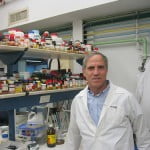The close confines of space-station living demand that water in all its formats, including sewage, must be recycled and renewed. It can’t be dumped in space, and it’s not safe to keep contaminated water in an enclosed environment.
America’s National Aeronautics and Space Administration (NASA) recognized the importance of clean water in space, and invited an Israeli scientist to test his new nanotechnology solution for this problem aboard an Atlantis mission in the summer of 2011.
Related Stories:
Researchers Will Launch Three Nano-Satellites Simultaneously To Space
Electric Bacteria Turn Wastewater Into Energy
Bacteria are some of the most difficult organisms to kill. Thanks to a hard outer surface, they can evade many attempts to subdue them. On board a space station, and especially in the closed environments of hospital wards, destroying bacteria is very much a sought-after goal for water purification researchers and companies.
Prof. Avraham Domb from the Department of Pharmaceutics at the Hebrew University of Jerusalem was able to develop a new kind of anti-bacterial material, based on a synthesized polymer with active sites that decontaminate bacteria.
[youtube]http://www.youtube.com/watch?v=5_TIrhgYVyA[/youtube]
Domb has developed a molecule based on an ammonium group. With one part of the molecule sticking out like a miniature sword, the molecule has the power to kill bacteria in their tracks. Loaded onto plastic surfaces, or added as a concentrate in liquid, the molecule and its sword-like arm rupture the hard bacteria surface on contact, causing the inside workings of the bacteria, the organelles, to spill out.
Domb is developing a material that can deactivate or physically remove bacteria, viruses and other kinds of microbes from water. His new approach might provide answers that will help future space missions, hospitals and home consumers.
“The experiment was initiated by Strauss Water,” Domb says. “The intention is to develop a new and more effective filter for consumer-owned water purification systems.”
The Israeli company Strauss Water is a subsidiary of the Strauss Group, Israel’s second-largest food and beverage company. Strauss Water manufactures and markets in Israel water filters for homes and offices. Domb is now working alongside the company on developing improved technology, so that water contaminants like arsenic, lead, cadmium and mercury – found occurring naturally in water wells – are lowered to levels below the recommended safety guidelines of the international Water Quality Association. Organic chemicals like herbicides and industrial contaminants, as well as bacterial and biological materials, are also targeted.
Sign up for our free weekly newsletter
SubscribeThe NASA experiment
NASA asked Domb to put together an experiment together, to test if his solution would work in space conditions. Domb prepared two vials of water containing bacteria. In one vial, the surface was coated with his technology; the other was not.
On return to Earth, the experiment was deemed a success, he says. Now the Israeli laboratory is looking at the results more deeply, probing for DNA damage to the bacteria, for instance.
Focusing on a polymeric material, a nanotechnology, Domb’s objective was to develop a polymer that is anti-microbial, and when added to water can safely be consumed by people at low amounts. He also needed to develop a bio-filter made from these polymer particles so that the bacteria will be neutralized when it passes through the particles. And lastly, the experiment NASA brought on board, a plastic that could be loaded with the polymers so that bacteria will be killed upon contact.
If Domb’s material goes commercial, it can be impregnated into pipes and tubing, and could even be used in bacterial hotspots, such as public bathroom faucets.
“This is not only for water, but can be used on any kind of self-sterilizing surface,” says Domb, “like on a table where you eat so that the table is self-decontaminating.”
Another application is in dental work, he says. Imagine a plastic that can be added to dentures and restoration materials in dentistry to inhibit the growth of bacteria. Would that mean bye-bye to halitosis and new cavities?
Domb is not sure if the technology will be used in space sewers of the future, but industry’s interest in it certainly fuels a whole range of ideas for home water filters and for use in the food industry and in hospitals.
Photo by GovWin a Deltek Network
Related posts

Editors’ & Readers’ Choice: 10 Favorite NoCamels Articles

Forward Facing: What Does The Future Hold For Israeli High-Tech?

Impact Innovation: Israeli Startups That Could Shape Our Future





Facebook comments